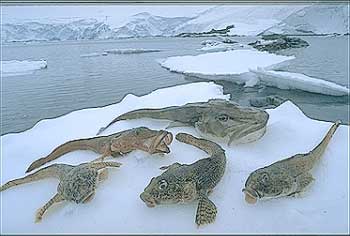Antarctic ‘cod’ adopt a winter survival strategy similar to hibernation
 Washington, March 6: Scientists have discovered an Antarctic fish species that adopts a winter survival strategy similar to hibernation.
Washington, March 6: Scientists have discovered an Antarctic fish species that adopts a winter survival strategy similar to hibernation.
The fish in question is the Antarctic ‘cod’ Notothenia coriiceps, which was observed by a team of scientists from the British Antarctic Survey (BAS) and the University of Birmingham to literally ‘put itself on ice’ to survive the long Antarctic winter.
The research by the team demonstrated that at least some fish species can enter a dormant state, similar to hibernation that is not temperature driven and presumably provides seasonal energetic benefits.
Scientists already know that Antarctic fish have very low metabolic rates and blood ‘antifreeze’ proteins that allow them to live in near-freezing waters.
But, this study demonstrated that Antarctic fish - which already live in the ‘slow lane’ with extremely low rates of growth, metabolism and swimming activity - can in fact further depress these metabolic processes in winter.
The study by the research team also proved that the fish activate a seasonal ‘switch’ in ecological strategy – going from one that maximises feeding and growth in summer to another that minimises the energetic cost of living during the long, Antarctic winter.
According to lead author Dr Hamish Campbell, the interesting thing about these Antarctic cod is that their metabolic rates are reduced in winter even though the seawater temperature doesn’t decrease much.
“It seems unlikely that the small winter reductions in water temperature that do occur are causing the measured decrease in metabolism,” said Campbell.
“However, there are big seasonal changes in light levels, with 24 hour light during summer followed by months of winter darkness – so the decrease in light during winter may be driving the reduction in metabolic rates,” he added.
According to Dr Keiron Fraser from BAS, “This is our first insight into how these fish live in winter. It appears they utilise the short Antarctic summers to gain sufficient energy from feeding to tide them over in winter.”
“The hibernation-like state they enter in winter is presumably a mechanism for reducing their energy requirements to the bare minimum,” he added. (ANI)